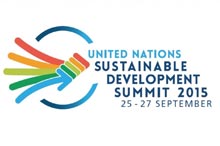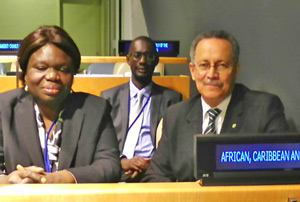ACP backs South-South & Triangular cooperation, science & innovation, SIDS at UN Summit
 New York, 25 September 2015/ ACP: High level representatives of the African, Caribbean and Pacific Group of States, led by Secretary General H.E Dr. Patrick Gomes are in New York to attend the United Nations Sustainable Development Summit from the 25th to 27th September, carrying a key message from the group’s 79 member countries.
New York, 25 September 2015/ ACP: High level representatives of the African, Caribbean and Pacific Group of States, led by Secretary General H.E Dr. Patrick Gomes are in New York to attend the United Nations Sustainable Development Summit from the 25th to 27th September, carrying a key message from the group’s 79 member countries.
The ACP delegation, which also includes the Ambassador of Guinea to the EU and Chair of the ACP’s Ad-hoc Ambassadorial Working Group on the Post-2015 Development Agenda H.E Dr. Ousmane Sylla, the Ambassador of Gabon to the EU and Chair of the Sub-Committee on Sustainable Development H.E Mrs. Felicité Ngoubili, Chef de Cabinet Amb. Mamour Jagne and Chief of Protocol Mr. Abdourakhmane Samb, will be meeting with various leaders, national and regional representatives, and UN officials during their mission.
The aim is to lay the foundation for the implementation of the post-2015 agenda in ACP countries, while enhancing the ACP Group’s observer status and effectiveness at the United Nations. It is also an opportunity to advance preparations for the 8th ACP Summit of Heads of State and Government scheduled for May 2016.
“The commitment to sustainable development, poverty eradication and the end of this disturbing rapid increase of inequality, within and between nations, is not an option but an imperative for the ACP Group of States,” states the Secretary General Dr. Patrick Gomes.
He adds that with regards to the UN Summit, the road map for concrete action to realise the Sustainable Development Goals (SDGs) will give effect to: an ACP Forum on SIDS to assist in implementing the S.A.M.O.A Pathway (SIDS Accelerated Modalities of Action); the coordination of South-South & Triangular Cooperation by the ACP, acting as a Facilitator and Hub; and upscaling the science, technology and innovation programmes under the Intra-ACP development cooperation of the 11th European Development Fund (EDF) to support the Technology Facility Mechanism to be launched at the UN Summit.
The Secretary General stresses the need for an inclusive, transformative and effective global partnership, echoing the joint declaration made by the ACP Group and the European Union in June 2014. The ACP-EU Declaration on the Post-2015 Development Agenda calls for a framework that addresses, inter alia, 1) basic living standards and a life of dignity for all; 2) inclusive and sustainable economic growth; 3) the sustainable use, management and protection of natural resources; 4) good governance, equality and equity; and 5) peaceful and stable societies which are free from violence.
The joint document also highlights the challenges faced by Small Island Developing States (SIDS), including those related to climate change; the need to ensure adequate and predictable financing to implement the SDGs; and the issue of technology development and transfer in developing countries.
The Secretary General concludes that: “The ACP Group pledges the comparative advantage of its tri-continental solidarity and experience in managing development cooperation, with special attention given to the most vulnerable countries, in particular African countries, the least-developed, landlocked developing countries and Small Island Developing States.”
For more information contact:
In New York: Chief of Protocol Mr. Abdourakhmane Samb at samb@acp.int
In Brussels: Press Attache Ms. Josephine Latu-Sanft +32 2 7430617 or latu@acp.int
Background on the ACP-EU Declaration on Post-2015 Development Agenda
- The ACP Group is an inter-governmental organisation established in 1975, which includes 79 Member States from Sub-Saharan Africa, the Caribbean and the Pacific. The organisation works in partnership with the European Union within the framework of the ACP-EU Cotonou Partnership Agreement under three pillars of trade, development cooperation and political dialogue.
- In June 2014, the ACP Council of Ministers meeting in Nairobi, adopted a Joint ACP-EU Declaration on the post-2015 development agenda which stated that the objective of the post-2015 development agenda should be to eradicate poverty and achieve sustainable development, through the establishment of a single comprehensive and coherent universal framework.
- The joint declaration indicated that the outcome document on the post-2015 development agenda, to be adopted in New York, must be ambitious and transformative while completing the unfinished business with regards to the Millennium Development Goals.
- In addition, it must take into consideration the Samoa Pathway which is the outcome document of the Third United Nations International Conference on Small Island Developing States (SIDS) held in Samoa in September, 2014 and must recognise that the adverse impacts of climate change poses immediate and long term significant risks to the efforts of developing countries to eradicate poverty and achieve sustainable development.
- The Joint declaration emphasized that the framework should address, inter alia, 1)basic living standards and a life of dignity for all, 2) Inclusive and sustainable economic growth, 3) The sustainable use, management and protection of natural resources, 4) Good governance, equality and equity, 5) Peaceful and stable societies which are from violence.
- The Joint ACP-EU Declaration called for an inclusive, transformative and effective global partnership to underpin the post-2015 development agenda, which should address in a coherent, integrated and balanced manner, the environmental, social and economic dimensions of sustainable development.
- The joint declaration stated that the goals should be limited in number, easy to understand and communicate, and should drive meaningful action. The associated targets and indicators should be formulated to be measurable, reportable and verifiable, and take into consideration inter-linkages within the framework.
- With regards to the means of implementation, there is need to address in a comprehensive manner to ensure adequate and predictable financing from a variety of sources, including, domestic and international public resource mobilization, debt sustainability, innovative financing and mobilization of private financial and investment flows. In addition, the post-2015 development agenda must address issues related to science, technology and innovation, including technology development and transfer on mutually agreed terms and capacity building, should be addressed in the outcome document.
- Finally, for the ACP and the EU, we believe that the post-2015 development agenda should be nationally-driven, and that the primary responsibility for its implementation lies with each country, in collaboration with relevant stakeholders at the national, regional and international levels, including inter alia, civil society and the private sector.
